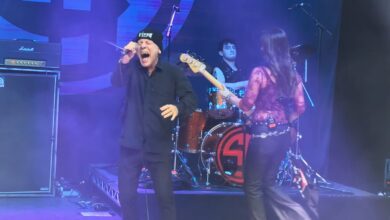Billy Idol Honors Ozzy With a Stunning “No More Tears” Performance at Nearly 70
At the 2024 Rock & Roll Hall of Fame induction ceremony, a distinguished tribute unfolded for Ozzy Osbourne, recognizing his solo legacy after previously being inducted for his work with Black Sabbath. Celebrated rock and metal artists converged to honor him, delivering heartfelt performances that resonated with fans worldwide.
Among the standout moments was Billy Idol’s rendition of “No More Tears.” Idol, known for his punk-rock intensity and charismatic stage presence, brought a fresh yet respectful interpretation to the powerful ballad, maintaining its dramatic weight while stamping his own stylistic flair.
The performance featured a remarkable ensemble of backing musicians, including Steve Stevens, Robert Trujillo, Zakk Wylde, Chad Smith, Andrew Watt, and Adam Wakeman. This all-star backing ensured that the rendition retained its musical depth and honoured the original’s emotional and sonic impact.
Delivered at Cleveland’s Rocket Mortgage FieldHouse on October 19, 2024, the induction spanned musical generations; fans watched as iconic voices came together in tribute to Osbourne. Idol’s performance of “No More Tears” resonated deeply, attributing to both nostalgia and a revival of Ozzy’s dramatic emotional edge.
The significance of this tribute was underlined by Osbourne being inducted as a solo artist for the second time—having already been recognized in 2006 as part of Black Sabbath. This second induction cemented his enduring impact beyond the band context.
Billy Idol’s rendition was carefully crafted. His commanding vocal delivery maintained the original’s haunting melody, while grounded in his trademark gritty energy. The balance between homage and personal style allowed the song’s emotional core to shine through without veering into mimicry.
Guitarist Steve Stevens, known for his dynamic playing with Idol, and soloing elements, provided blazing, textured layers that mirrored the theatrical grandeur of the original “No More Tears,” while amplifying it with distinctive flair. His performance elevated the emotional resonance.
Zakk Wylde, Ozzy’s long-time guitarist who helped define the song’s original sound, also participated in the performance. His presence linked the rendition back to Osbourne’s solo era, preserving continuity and paying tribute to the classic’s roots.
Robert Trujillo from Metallica and Chad Smith of the Red Hot Chili Peppers anchored the rhythm section, lending powerful, precise groove to the performance. Their established rock credentials added gravitas, while supporting the dynamics that the song demands.
Andrew Watt and Adam Wakeman, both accomplished multi-instrumentalists and producers, further reinforced the musical texture. Wakeman’s keyboard layers echoed the original’s atmospheric tension, while Watt’s production sensibility helped tie the tribute together sonically.
The visual presentation added to the tribute’s emotional punch. Set amidst the formal ceremony atmosphere, Idol’s measured performance—sung with restraint and conviction—deepened the song’s pathos, reminding audiences of the narrative weight behind “No More Tears.”
Audience and industry reception affirmed the performance’s impact. Commentators noted that it struck a rare balance—neither a lip-service rendition nor a reinvented cover, but a respectful, stirring homage driven by genuine admiration and musicality.
As an indelible highlight of the evening, Idol’s rendition reaffirmed Osbourne’s influence across genres. A punk-rock icon covering heavy-metal tragedy, supported by figures from thrash, funk-rock, and metal, underscored Osbourne’s cross-generational legacy.
This rendition also served as a reminder of “No More Tears” as one of Ozzy’s most celebrated solo compositions—a song born from spontaneous jam sessions, featuring contributions from Zakk Wylde and Mike Inez, and revered for its emotional depth and musical scope.
In sum, Billy Idol’s performance of “No More Tears” at the 2024 Rock & Roll Hall of Fame induction stands out as a masterful tribute. It was at once reverent, musically rich, and emotionally resonant—one of the most memorable homages in Ozzy’s storied career.





